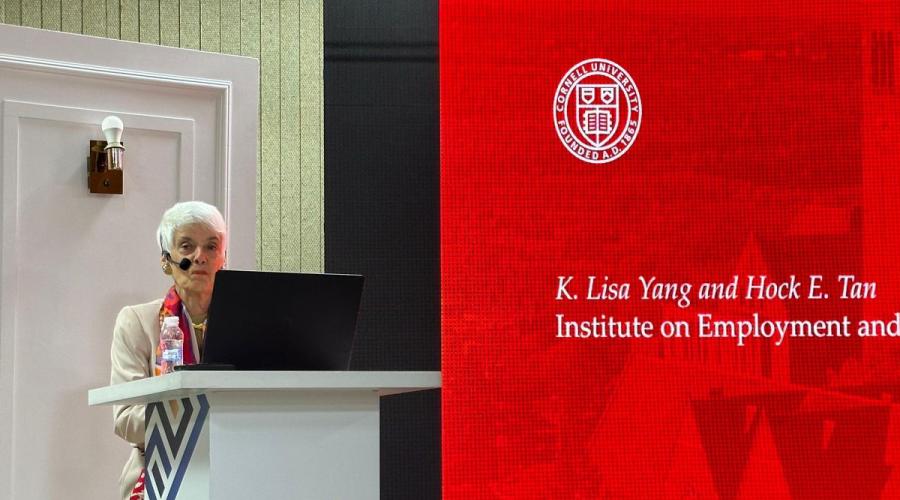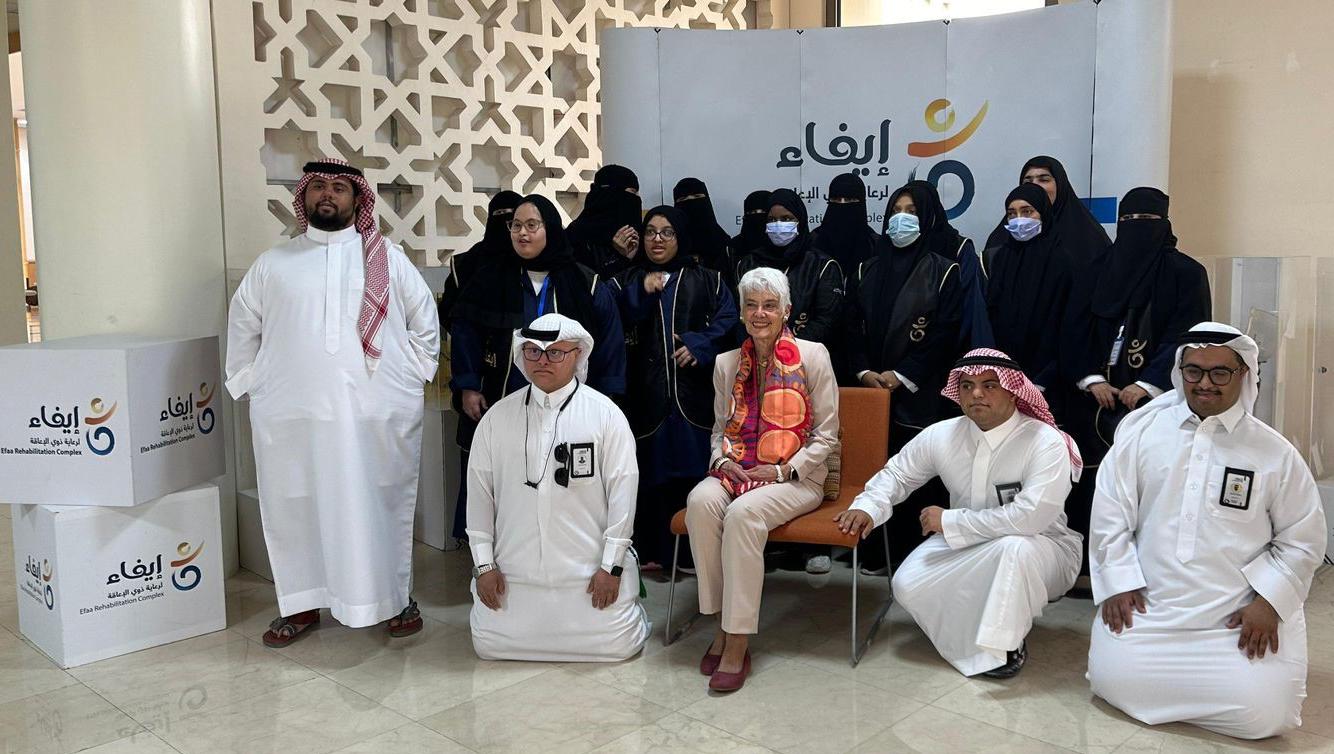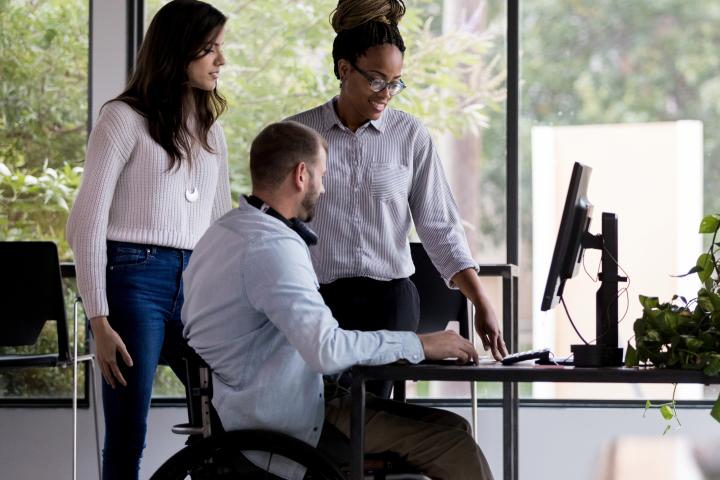
Bruyère Educates Saudi Officials on Disability Rights
Susanne Bruyère, a disability rights activist who has spent her career researching and advocating for policy change around inclusive hiring, recently assisted Saudi Arabia’s efforts to promote disability rights.
Invited by the U.S. Department of State to participate in the U.S. Speaker Program, Bruyère, the academic director of the ILR School K. Lisa Yang and Hock E. Tan Institute on Employment and Disability, spent five days in the cities of Riyadh, Damman and Jedda working with U.S. Embassy and U.S. Consulate staff members to give a series of 15 presentations. Representatives of government agencies, employer associations, local area voluntary organizations serving individuals with disabilities and higher educational institutions attended.
“To be successful in improving employment outcomes for people with disabilities, it is necessary to engage in a comprehensive approach,” Bruyère said in an interview. “We must garner government and related legislation support to ensure rights and inclusive educational preparation institutions.
“Additionally, there must be meaningful engagement from employers and a voluntary sector of community organizations that can assist with job training, development and placement support. So, it was important that the embassy team and I had an opportunity to engage with all these significant stakeholders.”
According to Bruyère, people with disabilities comprise 15% of the world’s population – over one billion people. The disparity of access to work between people with and without disabilities is a universal social and labor market challenge for policymakers.
To address the disparities, the United Nations in 2006 passed the U.N. Convention on the Rights of People with Disabilities. Article 27 of that resolution states that the rights of people with disabilities to work must be actively supported by legislation. As a result, the countries that signed the resolution must put legislation in place that will assure that these rights are being executed at the country level, and among those countries is Saudi Arabia.
Bruyère met with representatives of several Saudi agencies – the Ministries of Human Rights, Human Resource and Social Development, and the Saudi Authority of People with Disabilities – that create the legislation governing the employment of people with disabilities.
“I found it very interesting to learn about Saudi initiatives to improve employment outcomes for individuals with disabilities in the kingdom,” said Bruyère, who has been immersed in the Americans with Disabilities Act of 1990 legislation for many years.
One such initiative, Tawafeq, is a unique platform for job seekers that considers capabilities, personal preferences and local area opportunities. Another, Mowaamah, is a governmental voluntary licensing system for businesses that wish to develop their work environments to be inclusive and more supportive of people with disabilities by obtaining an authorized certificate.

Bruyère presented on U.S. legislative, educational and service delivery efforts to improve employment outcomes for people with disabilities to several Saudi service organizations, including the Saee Society in Riyadh, the Prince Sultan Rehabilitation Complex in Damman and the Help Center in Jeddah.
“Each of these organizations had something unique, which I found to be of great interest,” Bruyère said. “The Saee Society has a most impressive array of training programs across a range of occupations and a growing track record of success in job placements post-training. The Prince Sultan Rehabilitation Complex includes an extensive array of onsite services to address a wide variety of rehabilitation needs for children with disabilities, as well as providing an Able Sports Program.
“The Saudi Special Olympics team trained at the center’s Able program and achieved significant success, securing 25 medals, including two golds, at the Berlin Special Olympics. The Help Center provides an extensive educational program for children and adults with disabilities and is embarking on adding an employment component to their training opportunities,” she said.
While in Jeddah, Bruyère also met with employers who are members of the Qaderoon Network for Business Owners and Disability, a national, local company whose mission is to support and empower business owners to integrate and include people with disabilities as active and equal members of the workforce.
“This was a particularly exciting part of the trip for me, as I had been introduced to this association when it started 10 years ago,” Bruyère said. “It was wonderful to see the impressive growth in membership and the force for positive change that this has become.”
Bruyère was also introduced to a broader Middle East disability rights legislation perspective in meeting with representatives from the Gulf Cooperation Council, whose headquarters are in Riyadh. The council member states are the Kingdom of Saudi Arabia, United Arab Emirates, Kingdom of Bahrain, Sultanate of Oman, Qatar and Kuwait.
At the council’s headquarters, Bruyère gave a presentation, “Improving Employment Outcomes for People with Disabilities: The Role of Government, Education, Community Support Systems, and Private Enterprise,” and was given an overview of disability rights legislation across the six countries.
The closing meeting of Bruyère’s five days in the kingdom was a university-to-university engagement with administrators, faculty, and graduate and undergraduate students at the King Abdulaziz University Disability Center. There, she presented “The Role of the University in Educational and Employment Inclusion of People with Disabilities,” met with the students with disabilities committee and addressed questions from faculty and students about disability inclusion and U.S. higher education.
“During a time when there is such conflict in the Middle East, we must not lose sight of the fact that disability rights are also human rights,” Bruyère said. “It is a potential point of common understanding of the human condition that binds us all and transcends political and socio-cultural differences.
“Opportunities like these allow institutions like Cornell to contribute to a broadened understanding between countries and people and, hopefully, further advance the rights of people with disabilities globally.”


